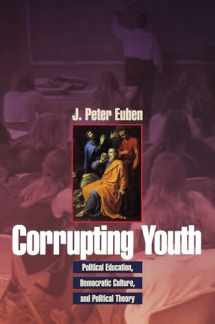
Corrupting Youth
Book details
Summary
Description
In Corrupting Youth, Peter Euben explores the affinities between Socratic philosophy and Athenian democratic culture as a way to think about issues of politics and education, both ancient and modern. The book moves skillfully between antiquity and the present, from ancient to contemporary political theory, and from Athenian to American democracy. It draws together important recent work by political theorists with the views of classical scholars in ways that shine new light on significant theoretical debates such as those over discourse ethics, rational choice, and political realism, and on political issues such as school vouchers and education reform. Euben not only argues for the generative capacity of classical texts and Athenian political thought, he demonstrates it by thinking with them to provide a framework for reflecting more deeply about socially divisive issues such as the war over the canon and the "politicization" of the university.
Drawing on Aristophanes' Clouds, Sophocles' Antigone and Oedipus Tyrannos, and Plato's Apology of Socrates, Gorgias, and Protagoras, Euben develops a view of democratic political education. Arguing that Athenian democratic practices constituted a tradition of accountability and self-critique that Socrates expanded into a way of doing philosophy, Euben suggests a necessary reciprocity between political philosophy and radical democracy. By asking whether we can or should take "Socrates" out of the academy and put him back in front of a wider audience, Euben argues for anchoring contemporary higher education in appreciative yet skeptical encounter with the dramatic figure in Plato's dialogues.


We would LOVE it if you could help us and other readers by reviewing the book
Book review



